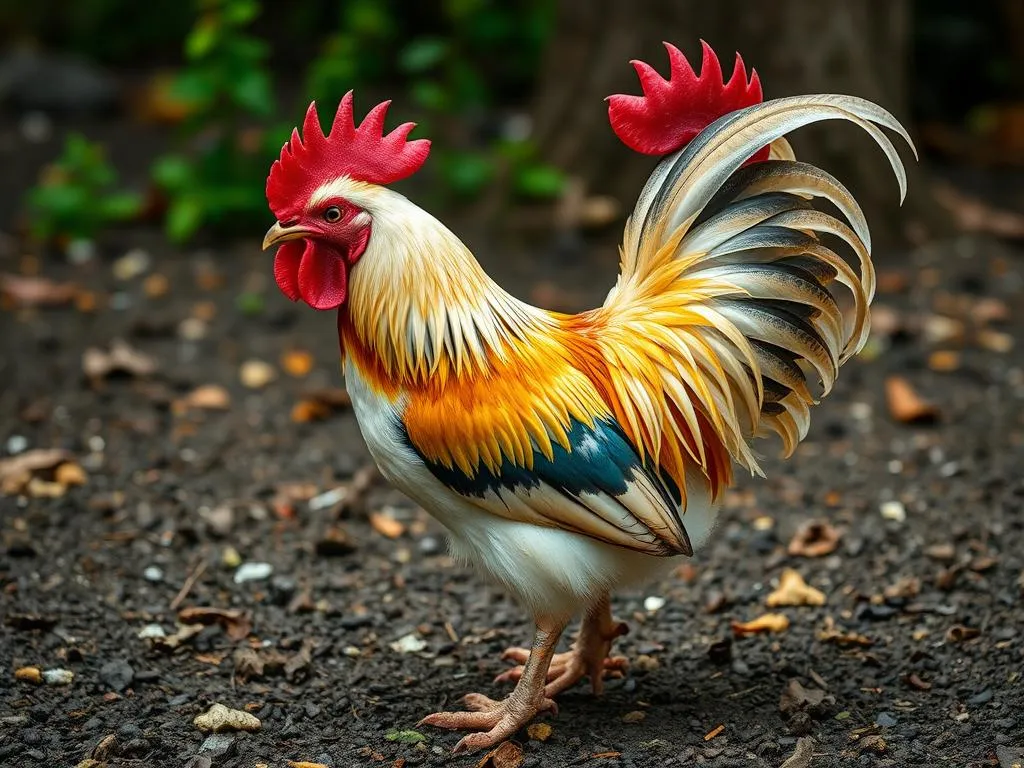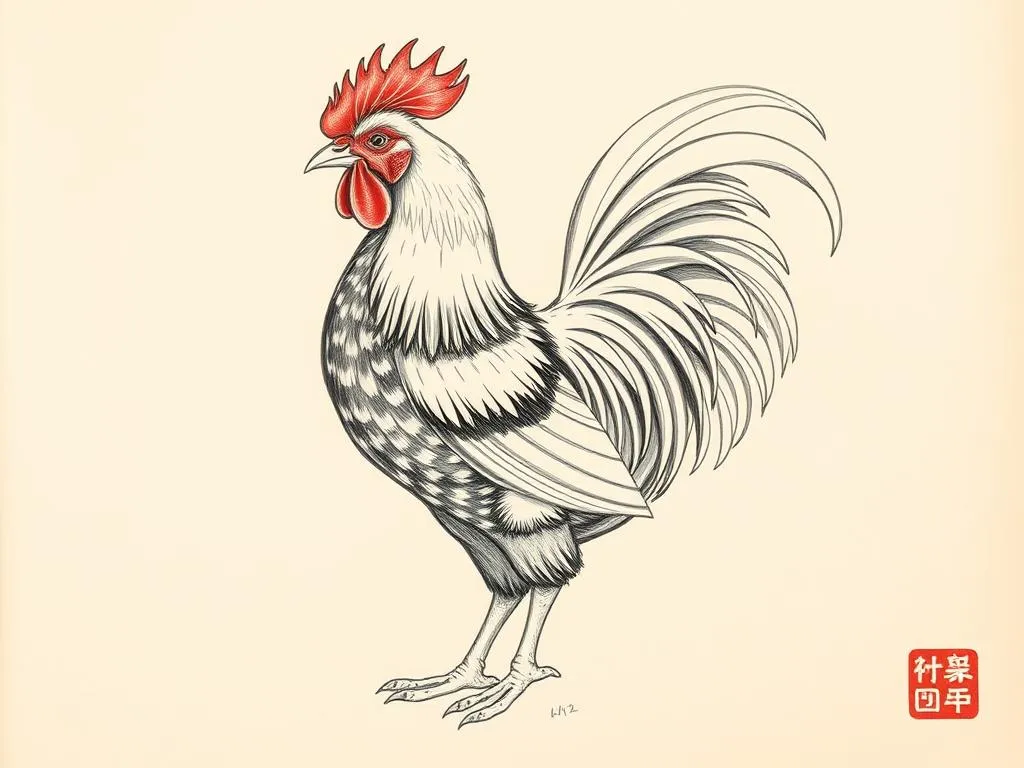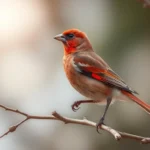The Symbolism of the Japanese Bantam Chicken: A Deeper Dive into Its Spiritual Significance

Disclaimer: Some images on this website are AI-generated artworks and may not accurately represent real animals.
The Japanese bantam chicken is more than just a charming creature found in backyards and farms; it is steeped in rich symbolism and cultural significance. This article will explore the multifaceted nature of the Japanese bantam chicken, particularly its symbolism and meaning within Japanese culture.
Understanding the Japanese Bantam Chicken
Origins and History
The Japanese bantam chicken has its roots deeply embedded in the history of Japan. This breed is believed to have been developed in the 17th century, primarily in the southern regions of Japan. Originally bred for their aesthetic appeal rather than for meat or eggs, they gained popularity for their unique appearance and spirited personality.
In Japanese society, these bantams symbolize more than just a farm animal; they represent tradition, artistry, and a connection to nature. They have been featured in various cultural expressions, including art and poetry, establishing their place in the heart of Japanese culture.
Physical Characteristics
The Japanese bantam chicken is known for its distinct physical traits that set it apart from other chicken breeds. Below is a table summarizing these characteristics.
| Feature | Description |
|---|---|
| Size | Small, typically weighing between 1-2 pounds |
| Plumage | Dense and fluffy feathers, often with a unique arrangement |
| Color | A variety of colors including black, white, red, and patterned varieties |
| Comb | Unique single or rose comb, often small in size |
| Legs | Short and sturdy, sometimes feathered at the shanks |
These physical features contribute to the bantam’s charm, making them popular among poultry enthusiasts and collectors. Their compact size and striking appearance make them an appealing choice for urban and suburban dwellers.
Behavioral Traits
The Japanese bantam chicken is known for its friendly and social nature. These birds are curious and often engage playfully with their surroundings. They are not only charming companions but also serve a functional role in traditional Japanese farming practices. In rural communities, bantams were valued for their ability to control pests and insects, thus contributing to sustainable agricultural practices.
The bantam’s spirited personality makes it a favorite among children and adults alike. Their playful demeanor and curious nature allow them to thrive in a variety of environments, whether on a farm or in a backyard.

Symbolism & Spiritual Meaning
Courage and Resilience
One of the most profound symbolic meanings associated with the Japanese bantam chicken is its representation of courage and resilience. Despite their small size, these birds exhibit a fierce spirit and tenacity that belies their appearance. Folklore is replete with stories of bantams standing their ground against larger predators, embodying the essence of bravery.
In Japanese culture, the bantam is often depicted as a symbol of facing adversity with determination and strength. This connection to courage can serve as an inspiration for individuals seeking motivation in their own lives, reminding them that true strength often comes from within, regardless of external appearances.
Connection to Fertility and Abundance
The Japanese bantam chicken is also associated with fertility and abundance in various cultural contexts. In Japan, chickens are often seen as symbols of prosperity, particularly during harvest festivals and celebrations. The presence of bantams is thought to usher in good fortune and ensure a bountiful harvest.
During traditional festivals, bantam chickens may be featured in rituals and displays, emphasizing their role as a connection to the earth and its cycles. This association with fertility extends beyond agriculture, symbolizing growth and the nurturing aspects of life.
Guardianship and Protection
Another significant aspect of the Japanese bantam chicken is its role as a guardian and protector. In many cultures, chickens are considered to possess protective qualities, and the bantam is no exception. Traditionally, these chickens were kept around homes and farms to ward off evil spirits and protect the household.
The belief in the protective nature of bantams extends into various cultural rituals, where they are offered as guardians against misfortune. Their vigilant behavior and keen awareness of their surroundings have led many to regard them as natural protectors, further enhancing their symbolic significance.
Japanese Bantam Chicken in Dreams
Interpretation of Bantam Chickens in Dreams
Dreams involving the Japanese bantam chicken can hold significant meanings. To dream of a bantam chicken often symbolizes themes of fertility, joy, and community. The presence of the chicken in one’s dreams may indicate a desire for growth, nurturing relationships, or a call to reconnect with one’s roots.
The symbolism of bantam chickens in dreams can vary depending on the context of the dream. Below is a table outlining common interpretations based on various scenarios involving bantam chickens.
| Dream Scenario | Symbolic Meaning |
|---|---|
| Seeing a bantam chicken | A sign of good fortune and prosperity |
| Holding a bantam chicken | Nurturing relationships and emotional connections |
| Bantam chicken laying eggs | Symbol of fertility and new beginnings |
| Bantam chicken in a flock | Emphasizing community and social connections |
| Bantam chicken protecting its young | Symbolizing guardianship and protective instincts |
These interpretations highlight the rich tapestry of meanings associated with bantam chickens in the dream world. Each scenario can evoke personal connections and emotional responses, encouraging reflection on one’s life experiences.
Common Themes
Recurring themes in dreams involving Japanese bantam chickens often revolve around community, protection, and nurturing. Many individuals report feelings of warmth and joy when dreaming of these charming birds. They can represent a longing for simpler times or a desire to reconnect with aspects of one’s cultural heritage.
Personal connections to the bantam may also play a significant role in how these dreams are interpreted. Whether it’s a childhood memory of a family farm or a cherished pet, the emotional responses elicited by these dreams can provide insight into the dreamer’s current life situation.
Modern Interpretations
Cultural Representations in Art and Media
The Japanese bantam chicken has been celebrated in various forms of art and literature throughout the ages. From traditional paintings to contemporary media, these birds symbolize beauty and grace. They have often been featured in Japanese ukiyo-e prints, where their elegance and charm are captured in vibrant colors and intricate detail.
In modern culture, bantam chickens have also found their way into popular media, inspiring artists, writers, and filmmakers. Their unique appearance and spirited nature continue to resonate with audiences, contributing to their status as cultural icons.
Bantam Chickens in Urban Farming
As urban farming gains popularity, the Japanese bantam chicken is increasingly becoming a favored choice for city dwellers. Their small size and manageable needs make them ideal for urban settings, allowing individuals to engage in sustainable practices while enjoying the companionship of these charming birds.
Keeping bantams in urban environments fosters community building and sustainability. Many urban farmers find joy in raising these birds, which can provide fresh eggs and serve as natural pest controllers. This resurgence of interest in bantams reflects a growing desire for sustainable living and a deeper connection to nature.
Key Takeaways
- The Japanese bantam chicken symbolizes courage, resilience, fertility, and protection.
- In dreams, bantam chickens often represent themes of community, nurturing, and good fortune.
- The cultural significance of bantams extends from traditional practices to modern urban farming, emphasizing their enduring appeal.
- Reflecting on the symbolism of bantam chickens can inspire personal growth and a deeper understanding of one’s relationships with nature and community.
Conclusion
The significance of the Japanese bantam chicken transcends its physical presence. Understanding the symbolism and meaning associated with this remarkable breed can deepen our appreciation for the interconnection between humans and animals. By exploring the cultural heritage and spiritual significance of the bantam, we invite a richer understanding of our own lives and the world around us.
As we reflect on these themes, we can find inspiration in the courage, resilience, and nurturing qualities embodied by the Japanese bantam chicken. In doing so, we not only honor this beautiful breed but also foster a greater connection to the natural world and its myriad of symbols.







